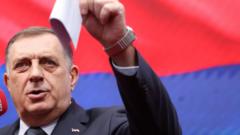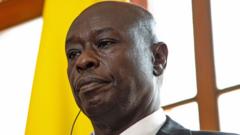In a haunting portrayal of the past, the world premiere of "Flowers of Srebrenica" at Sarajevo's War Theatre echoes the chilling events of July 1995, where over 8,000 Bosnian men and boys were murdered by Bosnian Serb forces. This play, representative of profound grief and ongoing ethnic tensions, is set against a backdrop of unresolved trauma in post-war Bosnia and Herzegovina.
The Srebrenica massacre remains one of the most notorious war crimes in European history, where survivors sought refuge under the protection of UN forces, only to be betrayed. Dutch soldiers failed to intervene as Bosnian-Serb General Ratko Mladić orchestrated the systematic executions of those who believed they were safe. In the aftermath, victims were cruelly disposed of in mass graves, and the act of re-burial only serves as a reminder of the anguish that families endure while searching for their lost.
As the play unveiled the haunting realities of these events, it also highlights the persistent divisions that plague Bosnia today. In a show of solidarity, the audience offered a rousing standing ovation, while in the Republika Srpska, political leaders deny the genocide, despite Mladić’s conviction at an international tribunal—an indication of the ideological schisms running deep in the country.
Selma Alispahić, the lead actress and former refugee from the war, expressed dismay over the ongoing denial of established truths. "It's exhausting to keep proving what has already been validated in international courts," she remarked. This denial exists amidst a political climate shaped by the contentious Dayton Peace Agreement, which established a structure dividing Bosnia along ethnic lines.
Recent developments in the Republika Srpska under President Milorad Dodik have further intensified tensions. His administration's aggressive push to withdraw from national institutions and reform a local police force reminiscent of wartime militias raises alarming concerns among both locals and international observers. The High Representative for Bosnia, Christian Schmidt, criticized Dodik’s maneuvers as dangerously irresponsible, necessitating a stronger international military presence to ensure peace.
The remembrance of the Srebrenica massacre remains a stark topic, with public observations prevalent in Sarajevo contrasted by the reluctance to commemorate in East Sarajevo. While local media and citizens work to honor the victims, government figures in the Republika Srpska often downplay the massacre's significance and emphasize atrocities committed by all sides, causing further friction.
Amidst this political discord, many Bosnians continue to emphasize unity and solidarity with the Srebrenica victims. For those like Mirela Osmanović, who lost two brothers in the massacre, the resurgence of ethnic tensions is unsettling. She finds herself grappling with the reality that the feelings of protection once felt are dwindling, echoing sentiments experienced during the conflict in the early '90s.
The cycle of ethnic and political manipulation surrounding the Srebrenica massacre continues to hinder healing efforts, leaving many in a state of uncertainty about the future of Bosnia and its enduring quest for reconciliation.









